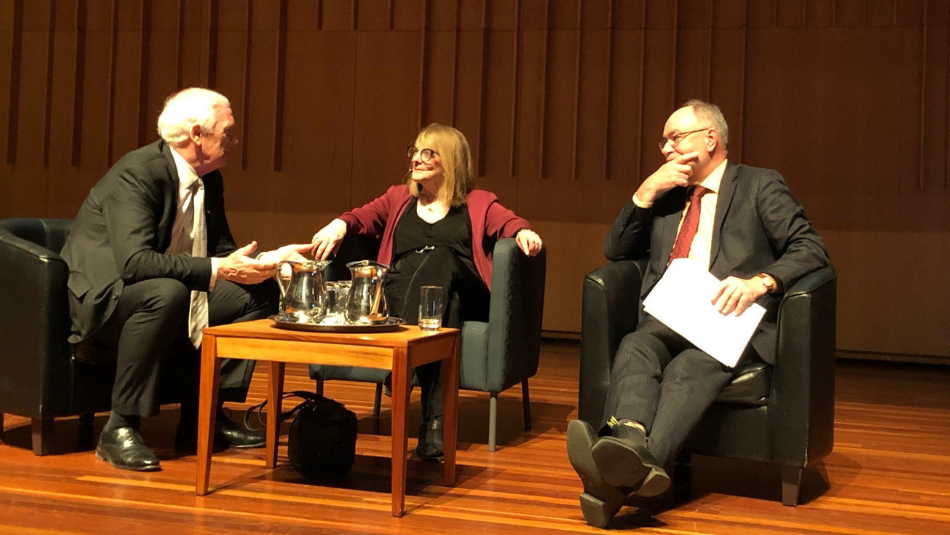
Distinguished Professor Elizabeth Loftus, center, with Australian National University Provost Mike Calford, left, and ANU’s Research School of Psychology Director Paul Martin on stage before receiving her Lifetime Achievement Award and delivering her lecture on the fiction of memory.
Distinguished Professor Elizabeth Loftus honored by Australian National University
For her pioneering research on the science of human memory, Elizabeth F. Loftus, distinguished professor of psychological science and criminology, law and society, has been honored with the Lifetime Achievement Award for Psychology from Australian National University.
Loftus is the first recipient of the award. In announcing the award, ANU posted:
“Professor Loftus was presented with the inaugural Lifetime Achievement Award from the Research School of Psychology to recognise her extraordinary career. Spanning nearly 50 years, Professor Loftus has written 23 books and published over 500 scientific articles on the malleability of human memory, eyewitness testimony, and courtroom procedure. She has been awarded many of the highest honours in the field of psychological science and has been elected president of the major international associations in psychology, including the Association for Psychological Science, the American Psychology-Law Society, and the Experimental Psychology division of the American Psychological Association. In broader recognition of her research, Loftus has also been elected to prestigious societies around the world, including the National Academy of Sciences, the Royal Society of Edinburgh, and the American Philosophical Society.”
The award, Loftus says, “was especially meaningful for me because it’s from a university where one of my former students, Eryn Newman, is now on the faculty.”
Loftus, who also has faculty appointments with UCI’s School of Law and in the Department of Cognitive Sciences, and is a fellow of the Center for the Neurobiology of Learning and Memory, was the founding director of the Center for Psychology and Law.
She received her undergraduate degree in mathematics and psychology from UCLA, and her Ph.D. in psychology from Stanford University. She also has six honorary doctorates for her research from universities in the United States, The Netherlands, Great Britain, Israel and Norway.
Loftus’ book, “Eyewitness Testimony,” won a National Media Award (Distinguished Contribution) from the American Psychological Foundation.
Her other honors and awards are numerous. The following is a partial list:
- In 2001, she won the William James Fellow Award from the Association for Psychological Science in 2001 for “ingeniously and rigorously designed research studies…that yielded clear objective evidence on difficult and controversial questions.”
- In 2002, a study published by the Review of General Psychology identified the 100 most eminent psychologists of the 20th century, and Loftus was No. 58, the highest ranking woman on the list. Topping the list were famed psychologists Sigmund Freud, B.F. Skinner, and Jean Piaget.
- In 2005, she won the $200,000 Grawemeyer Prize in Psychology to honor ideas of “great significance and impact.”
- In 2006, she was elected to the American Philosophical Society, the oldest learned society in the United States, established in 1745 by Benjamin Franklin.
- In 2010, she received the Warren Medal from the Society of Experimental Psychologists for “significant contributions to the understanding of the phenomenology of human memory, especially its fragility and vulnerability to distortion.” She also received the 2010 Scientific Freedom and Responsibility Award from the American Association for the Advancement of Science for “the profound impact that her pioneering research on human memory has had on the administration of justice in the United States and abroad.”
- In 2012, she received the University of California, Irvine Medal for “exceptional contributions to the vision, mission, and spirit of UC Irvine.”
- In 2013, she received the Gold Medal Award for Lifetime Achievement in Science from the American Psychological Foundation for “extraordinary contributions to our understanding of memory during the past 40 years that are remarkable for their creativity and impact.”
- In 2015, Cornell University gave her its Lifetime Achievement in Human Development, Law & Psychology Award “in recognition of a distinguished career of pioneering contributions in legal applications of psychological research.”
Loftus has been an expert witness or consultant in hundreds of court cases, including the noted McMartin preschool molestation case, the Hillside strangler and Abscam cases, the trial of Oliver North, the trial of the officers accused in the Rodney King beating, the Menendez brothers, the Bosnian War trials in the Hague, the Oklahoma bombing case, and litigation involving Michael Jackson, Martha Stewart, Scooter Libby and the Duke University lacrosse players.
As part of her latest award, Loftus delivered a lecture on the fiction of memory at Australian National University.
In her lecture, she talked about numerous studies in which people have been led to believe and remember things that never happened. Loftus said it was the first audience with whom she discussed false memories that were planted in the minds of Irish voters in conjunction with a major 2018 referendum in that country.
That research, a collaboration between several psychologists at UCI and two in Ireland, was published this month in Psychological Science. It concluded that voters may form false memories after seeing fabricated news stories, especially if those stories align with their political beliefs. Though conducted in the week preceding the 2018 referendum on legalizing abortion in Ireland, the research suggest that fake news is likely to have similar effects in other political contexts, including the U.S. presidential race in 2020.
“People will act on their fake memories, and it is often hard to convince them that fake news is fake,” Loftus says. “With the growing ability to make news incredibly convincing, how are we going to help people avoid being misled? It’s a problem that psychological scientists may be uniquely qualified to work on.”
— Mimi Ko Cruz